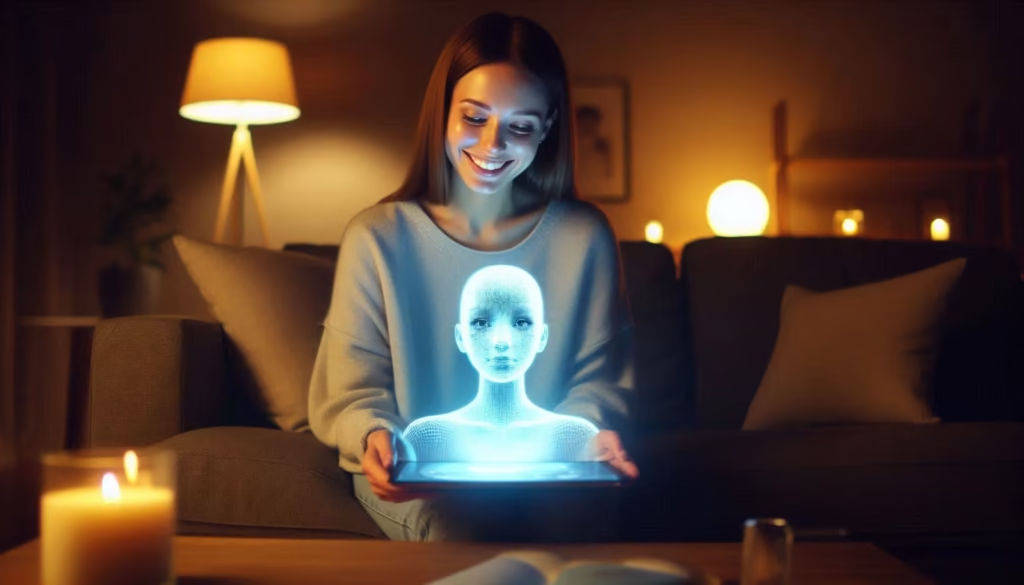Introduction
In 2025, the way we connect with others is evolving at lightning speed. From text-based bots to lifelike digital avatars, AI companions are becoming more sophisticated—and more common—in our everyday lives. Whether you’re looking for someone to talk to during a lonely night or a digital assistant who can help manage your mental health, AI is stepping in to fill the gaps.
What used to sound like a sci-fi fantasy has now turned into a new reality. The idea of virtual friendship is gaining traction, especially among younger generations and individuals who experience social isolation.
Read on to discover the truth behind the rise of AI companions and why they might be here to stay.
What Are AI Companions?
| Feature | Description |
|---|---|
| Definition | AI-powered entities designed to simulate friendship or emotional support. |
| Popular Forms | Chatbots, avatars, voice assistants, virtual pets, VR characters. |
| Core Technologies | Natural Language Processing, Machine Learning, Emotion AI, AR/VR. |
| Primary Use Cases | Companionship, therapy support, entertainment, elderly care. |
AI companions are essentially programs designed to simulate human-like interactions. Whether you talk to them through a mobile app, type messages, or speak with your voice, their purpose is simple: to offer connection and support.
Many people have already interacted with virtual friends like Replika, Character.AI, or Woebot without even realizing how deep these technologies go.
From Hobby to Habit
What began as a novelty app for casual chats has now transformed into a daily emotional support system for millions. Some users even form long-term “relationships” with their AI companions.
Quiet Transformation
Unlike typical tech booms, AI companions are becoming popular without much fanfare, spreading quietly but consistently across all age groups and cultures.
Types of AI Companions
• Text-based AI chatbots – Offer conversations through messaging
• Voice-interactive companions – Can speak and respond like real humans
• AR/VR companions – Virtual characters visible through devices or headsets
• Therapeutic bots – Support mental wellness through CBT and guided exercises
Why Are People Turning to AI for Friendship?
We live in a time where loneliness is a growing epidemic. In a world more connected than ever, many still feel alone.
Some reasons include:
• Post-pandemic social anxiety
• Remote lifestyles and WFH culture
• Elderly seeking connection
• Teens exploring identity safely
Emotional Safety & Consistency
One major appeal is emotional safety. Unlike humans, AI friends don’t judge, leave, or forget your birthday. They’re programmed to be available 24/7, attentive, and non-judgmental.
Many users say they feel more understood and valued by their AI friend than by real people.
The Real-World Impact of Virtual Companions
AI companions are more than just a passing trend. Here’s how they’re influencing lives today.
-
Mental Health Support
Apps like Woebot use CBT techniques to help users cope with anxiety, depression, and daily stress. -
Senior Companionship
AI avatars are being used in elderly care to combat loneliness, especially for those living alone. -
Social Skill Building
Teens and young adults use AI friends to practice conversations and boost confidence. -
Digital Dating Alternatives
Some AI companions are now romantic in nature, creating emotional intimacy without real-world risks.
CONCLUSION
AI companions aren’t replacing human relationships—but they’re certainly redefining them. For many, they offer connection, comfort, and companionship in a fast-paced world where emotional support can be hard to come by.
As AI continues to learn and adapt, we may soon see virtual friends become an integral part of our emotional lives, just like smartphones are today.
FAQ Section
Q1: Can AI companions replace real human friends?
A: Not completely. AI companions can provide emotional support, but they lack true empathy and understanding that human relationships offer.
Q2: Are AI friends safe to talk to?
A: Most are designed with privacy and safety in mind, especially mental health bots. Still, users should read privacy policies before sharing sensitive info.
Q3: Are AI relationships healthy?
A: They can be, especially when used to supplement—not replace—real-world connections. For some, they help reduce loneliness and social anxiety.
Q4: Can children use AI companions?
A: Some AI tools are child-friendly, but parental guidance is important. Not all AI is age-appropriate.
In summary, the rise of AI companions isn’t about replacing people—it’s about reimagining companionship in a digital world. Whether you’re curious, cautious, or already chatting with one, the future is unfolding, one virtual friend at a time.

